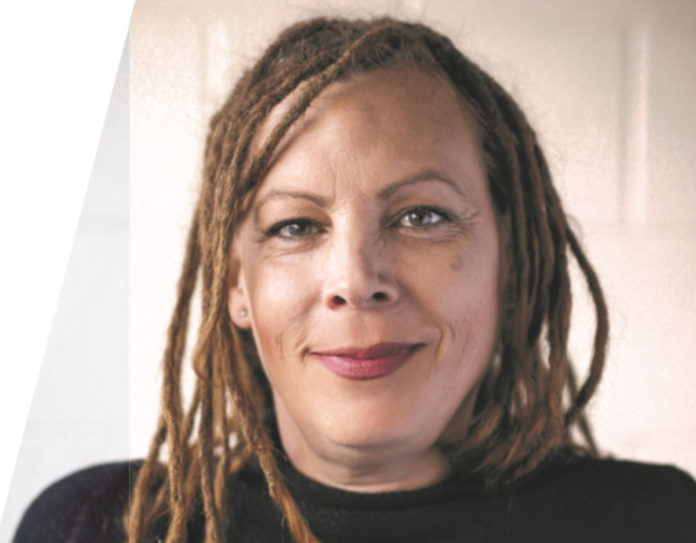This article has been updated to remove errors in the original version.
Jamie Shaw is a cannabis activist who helped medical dispensaries gain municipal support under a prohibitionist federal government.
She’s also a writer, filmmaker and is currently a partner at Groundwork Consulting, working to legitimize micro-growers and grey market retailers across Canada.
Jamie Shaw didn’t intentionally seek out cannabis, it’s almost as though it chose her.
The cannabis trailblazer first smoked pot at age 13, in a girls washroom at a Catholic school in Ontario.
Little did that teenager know she’d go on to found and head a plethora of organizations, many of them cannabis related.
During her life, Shaw said “what kept coming up was cannabis, again and again.”
She started her first business at age 19 (a theatre company run by and for young people) and her second four years later (an entertainment trade journal in Toronto).
In 2012, Shaw began work as a budtender with the BC Compassion Club. By June of 2013 she was vice-president of the Canadian Association of Medical Cannabis Dispensaries, becoming president in September of that year.
She was a founding partner of Groundwork Consulting, a founding director of the BC Independent Cannabis Association and a co-founder of Canada’s first Women Grow chapter.
Shaw has also previously been the Government Relations Director for MMJ Canada, she co-authored the Lift Retail Cannabis Training Course, and her writing on cannabis issues can be found in various publications.
Shaw was also an expert witness in the Allard trial that won patients the right to grow for themselves, and her lobbying efforts led to dispensary licensing in multiple B.C. municipalities.
In a recent interview with BotaniQ Magazine, Shaw recalled those lobbying efforts.
“We were lobbying the federal government. It was Harper’s government, so we were getting absolutely nowhere. It was absolutely impossible,” she said. “They were very clear that they were only doing the medical program because the judge ordered them to. They did not believe that it was a medicine. They were very anti-cannabis.”
That’s when they re-focused their efforts on the provincial government, but that didn’t go anywhere either.
“CAMCD was floundering pretty badly,” she noted. “It had never had a good business model and people were jumping ship thinking Harper’s plan spelled the end for dispensaries. Erin Prosk introduced me to Adolfo Gonzales, and the two of us were able to make a strong case to city council.”
“We went back to Drug Policy and Social Policy in Vancouver, who had always been supportive,” Shaw explained. “Through them we got through to council and we were successful in getting the licenses for medical cannabis. That was an interesting process, working with the licensing inspector and developing those regulations.”
“We wanted medical,” Shaw stressed. “It was about protecting medical patients for sure.”
In the long run, everyone knew prohibition was the issue, she noted.
“Eventually, ending that would be the ultimate goal. But I think now, people are a little surprised because they expected that was all that anybody cared about, and they don’t really understand why people aren’t happy that we still haven’t fixed the medical system,” she mused. “Because that really was the driving force behind this movement. But this is a medicine. Health Canada is refusing to call it a medicine because as soon as they do, it’s not taxable. There’s a lot of work to do now.”
Work, said Shaw, on both the scientific front, to better understand the benefits of cannabis, as well as in legislation.
“Our understanding of the cannabis plant isn’t nearly good enough now,” said Shaw. “There are about 160 cannabinoids and we understand maybe five of them, and even then it’s mostly just two that we’re starting to get a grasp on.”
And unfortunately, she added, “most of the research we’ve done until this point is useless because the studies don’t explain what the profile of the cannabis was.”
“So you get studies that say that cannabis causes anxiety, while the next day you get a study that says cannabis is good for anxiety. They don’t tell you what cannabis it was they were studying.”
Meantime, the legalization of recreational cannabis in Canada has been a bumpy road, she noted.
“It’s a big job, so everything has to be taken with a grain of salt. But it really seems like regulations are done from the bottom up,” Shaw said. “The higher the level (of government that takes on writing regulations) we go the less it makes sense.”
Shaw said she thinks U.S. states are passing Canada right now because they are more local than the federal government, and are better able to deal with the realities in a given state.
“It’s great for PEI compared to last year, or Nova Scotia, parts of it. But here B.C. it’s kind of going backward,” she said.
Shaw gave an example.
“When the City of Vancouver put in licensing for dispensaries in order to get Coastal Health support, they had to get rid of edibles,” Shaw explained. “So what had developed here were edibles based on what patients need – granola, dairy-free edibles, gluten-free edibles, for example – and almost overnight when those were no longer allowed. So people started making things like chocolate bars, things went unhealthy.”
Access is another issue, of course, as is the fact that some governments wish to bring the illicit market over to the legal side, while others want to ensure that doesn’t happen.
Then there’s the fact that cannabis is being taxed for medical patients.
“Taxes on medicine are not good, that’s not the way we should be approaching it,” Shaw stressed. “It’s particularly discouraging to see provinces that should be incorporating cannabis into their medical service plans not doing that. But instead being interested in recreational distribution…. And, we’ve seen the veterans gets screwed over already. Veterans Affairs was saying ‘You’re overcharging us,’ so they said ‘Well, we’re not going to keep giving you as much as you need.’”
As far as Shaw observes, things seem to be happening quickly, but not necessarily thoroughly.
“We’re throwing out more and more rules,” she said. “We haven’t even fixed medical and we’re moving onto recreational, then we’re moving onto edibles and we haven’t fixed recreational.”
Read also: WHO’S WHO: Meet cannabis champion Rosy Mondin
Read also: COLUMN: Canadian cannabis brands must be able to compete
Read also: PODCAST: Lawyer Kyla Lee talks cannabis-impaired driving with B.C.’s public safety minister



















